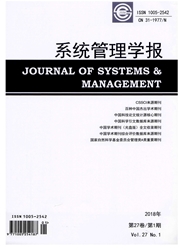

 中文摘要:
中文摘要:
采用多智能体建模与仿真方法,构建了由政府、用户和燃气公司3类智能体组成的天然气分时定价系统,建立了基于消费心理行为的居民用户需求响应模型,通过智能体的协作与交互模拟城市天然气管网由于价格变化所引起的管网负荷与系统主体的演化过程。根据天然气历史消费量数据,将1天按时间划分为峰、平、谷3个时段,按照“量大价高”的原则实施峰谷分时定价政策,模拟居民用户在不同需求响应强度下燃气管网利益主体的运行状态。结果表明:1居民用户用气所占比重直接影响天然气峰谷分时价格的实施,在峰谷价格浮动比率上调时,能源消费支出逐步增多,对应的用户的满意度逐步降低,但能够有效降低峰谷负荷差,促进燃气管网平稳运行;2居民用户在不同需求响应强度下,存在一个最优的峰平谷价格比例,使得系统目标最优。
 英文摘要:
英文摘要:
The multi-agent modeling and simulation method is used to establish a natural gas timeshare pricing system, including three categories of agents, i.e. government agent, gas enterprise agent and customer agent. A resident customer demand response model based on consumption psychological behavior is constructed, and the dynamic change process of demands and running states caused by natural gas price changes in the urban natural gas pipeline network is simulated through the cooperation and interaction among the agents. In order to apply the time- of-use pricing policy in the experiment, 24 hours in a day are divided into three different times, i.e. flat, valley and peak, and with the rule of "large amount, high price", the agents are simulated with regard to the running states in natural gas pipeline network with different customer demand response level. The computational results show that (1) the residents gas consumption ratio in natural gas pipeline network has direct influence on the policy of timeshare pricing. With the increase of price adjustment ratio, energy expense of residents may increase, and the residents' satisfaction may gradually reduce; meanwhile, the peak-valley load difference may be reduced effectively so that the natural gas pipeline network may run at a more stable state. (2) When the residents demand response level varies, there exists a price ratio to optimize the system objective for peak, flat and valley, respectively.
 同期刊论文项目
同期刊论文项目
 同项目期刊论文
同项目期刊论文
 Simulation on time-of-use pricing policy in China urban natural gas pipeline network based on multi-
Simulation on time-of-use pricing policy in China urban natural gas pipeline network based on multi- An optimal time-of-use pricing for urban gas: A study with a multi-agent evolutionary game-theoretic
An optimal time-of-use pricing for urban gas: A study with a multi-agent evolutionary game-theoretic A hybrid coding SA method for multi-item capacity-constrained production and delivery scheduling pro
A hybrid coding SA method for multi-item capacity-constrained production and delivery scheduling pro Application of Hybrid GA-SA Heuristics for Single-job Production-delivery Scheduling Problem with In
Application of Hybrid GA-SA Heuristics for Single-job Production-delivery Scheduling Problem with In 期刊信息
期刊信息
